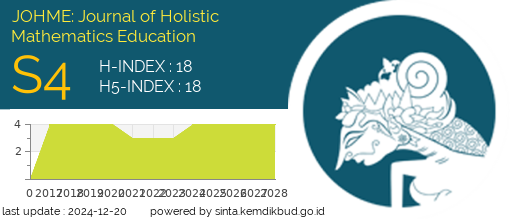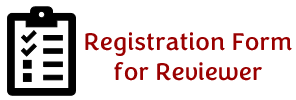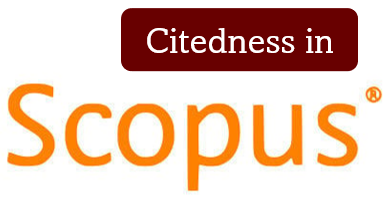PROFIL PENGETAHUAN NUMERASI MAHASISWA CALON GURU MATEMATIKA [PROFILE OF PROSPECTIVE MATHEMATICS TEACHERS’ NUMERACY KNOWLEDGE]
DOI:
https://doi.org/10.19166/johme.v8i1.8324Schlagworte:
numerasi, calon guru, matematikaAbstract
The 21st-century skills that students and teachers must have are literacy skills, learning skills and life skills. One of the literacy skills is mathematical literacy, also known as numeracy. This research aims to describe the numeracy knowledge profile of prospective mathematics teacher students. This type of research is quantitative descriptive research. The subjects of this research were 32 prospective mathematics teacher students at a private university in Yogyakarta. Data collection techniques in this research used questionnaires and interviews. The research results show that the majority of prospective mathematics teacher students are doubtful about their knowledge of numeracy. Furthermore, none of the students mentioned the complete meaning of numeracy skills; most only mentioned numeration as numbers and mathematical symbols, solving everyday problems, and number operations. Students are also unable to mention the content and context of numeracy questions. However, all students realize that as prospective mathematics teachers, it is important to study numeracy and implement it in the classroom. The suggestion to improve numeracy knowledge and skills are through lesson study that focuses on numeracy to introduce numeracy practices and as a model for prospective teachers, as well as using a student-centered learning approach, using real problems such as RME.
BAHASA INDONESIA ABSTRACT: Kemampuan abad ke-21 yang perlu dimiliki oleh siswa dan guru adalah kemampuan literasi, kemampuan belajar, dan kemampuan hidup. Salah satu kemampuan literasi adalah literasi matematika atau juga dikenal dengan istilah numerasi. Tujuan penelitian ini adalah untuk mendeskripsikan profil pengetahuan numerasi mahasiswa calon guru matematika. Jenis penelitian ini adalah penelitian deskriptif kuantitatif. Subjek penelitian ini adalah 32 mahasiswa calon guru matematika di salah satu universitas swasta di Yogyakarta. Teknik pengambilan data dalam penelitian ini menggunakan kuesioner dan wawancara. Hasil penelitian menunjukkan bahwa sebagian besar mahasiswa calon guru matematika ragu-ragu akan pengetahuan mereka tentang numerasi. Selain itu, tidak ada mahasiswa yang menyebutkan pengertian numerasi dengan lengkap, sebagian besar hanya menyebutkan numerasi sebagai angka dan simbol matematika, memecahkan masalah sehari-hari, dan operasi bilangan. Mahasiswa juga tidak mampu menyebutkan konten dan konteks soal numerasi. Walaupun demikian, semua mahasiswa menyadari sebagai calon guru matematika penting untuk mempelajari numerasi dan mengimplementasikannya di kelas. Hal yang bisa dilakukan untuk meningkatkan pengetahuan dan kemampuan numerasi yaitu melalui lesson study yang berfokus pada numerasi untuk mengenalkan praktik numerasi dan sebagai model bagi calon guru, serta menggunakan pendekatan pembelajaran yang berpusat pada siswa, menggunakan permasalahan nyata seperti PMR.
Literaturhinweise
Antoro, B. (2017). Gerakan literasi sekolah dari pucuk hingga akar sebuah refleksi. Retrieved from https://repositori.kemdikbud.go.id/14970/1/Gerakan%20Literasi%20Sekolah%20Dari%20Pucuk%20Hingga%20Akar%20Sebuah%20Refleksi.pdf
Aprilie, T., & Kasih, A. P. (2023). Mengapa kemampuan literasi dan numerasi siswa indonesia masih rendah? Retrieved from https://www.kompas.com/edu/read/2023/12/06/080000271/mengapa-kemampuan-literasi-dan-numerasi-siswa-indonesia-masih-rendah-?page=all
Askew, M. (2015). Numeracy for the 21st century: A commentary. ZDM - International Journal on Mathematics Education, 47(4), 707-712. https://doi.org/10.1007/s11858-015-0709-0
Ayuningtyas, N., & Sukriyah, D. (2020). Analisis pengetahuan numerasi mahasiswa matematika calon guru. Delta-Pi: Jurnal Matematika dan Pendidikan Matematika, 9(2), 237-247. https://doi.org/10.33387/dpi.v9i2.2299
Baker, D. (1998). Numeracy as social practice. Literacy & Numeracy Studies, 8(1), 37-50. https://doi.org/10.4324/9781315269474
Basri, H., Kurnadi, B., Tafriliyanto, C. F., Bayu, P., Madura, U., & Kotabumi, U. M. (2021). Investigasi kemampuan numerasi. Proximal: Jurnal Penelitian Matematika dan Pendidikan Matematika, 4(2), 72-79. Retrieved from https://e-journal.my.id/proximal/article/view/1318/1110
Fenti, H. (2020). Metodologi penelitian. Jakarta, Indonesia: Rajawali Pers.
Geiger, V., Goos, M., & Forgasz, H. (2015). A rich interpretation of numeracy for the 21st century: A survey of the state of the field. ZDM - International Journal on Mathematics Education, 47(4), 531-548. https://doi.org/10.1007/s11858-015-0708-1
Ginsburg, L., Manly, M., & Schmitt, M. J. (2006). The components of numeracy. Retrieved from https://files.eric.ed.gov/fulltext/ED495440.pdf
Goos, M., Dole, S., & Geiger, V. (2012). Auditing the numeracy demands of the Australian curriculum. Proceedings of the 35th Annual Mathematics Education Research Group of Australasia Conference, 314-321. Retrieved from https://files.eric.ed.gov/fulltext/ED573240.pdf
Goos, M., Geiger, V., & Dole, S. (2014). Transforming professional practice in numeracy teaching. 81-102. https://doi.org/10.1007/978-3-319-04993-9_6
Gusteti, M. U., Wulandari, S., Martin, S. N., Rahmalina, W., Azmi, K., Mulyati, A., & Hikmah, S. N. (2023). Pemanfaatan pojok literasi numerasi di panti asuhan Aisyiah untuk meningkatkan motivasi belajar dan pengetahuan matematika santri. Jurnal Pengabdian Masyarakat Multidisiplin, 6(3), 248-256. https://doi.org/10.36341/jpm.v6i3.3150
Hartatik, S. (2020). Indonesia kemampuan numerasi mahasiswa pendidikan profesi guru sekolah dasar dalam menyelesaikan masalah matematika. Education and Human Development Journal, 5(1), 32-42. https://doi.org/10.33086/ehdj.v5i1.1456
Hummel, B. (2019). What are 21st century skills? Retrieved from https://www.aeseducation.com/career-readiness/what-are-21st-century-skills
Kemdikbud. (2017). Peta jalan gerakan literasi nasional. Retrieved from http://repo.iain-tulungagung.ac.id/5510/5/BAB 2.pdf
Lestari, N. D. S., Pambudi, D. S., Kurniati, D., Maulana, A. P., Murtafiah, W., & Suwarno, S. (2023). Kesiapan guru matematika sekolah menengah dalam mengajarkan literasi dan numerasi melalui kurikulum merdeka. AKSIOMA: Jurnal Program Studi Pendidikan Matematika, 12(2), 1650-1660. https://doi.org/10.24127/ajpm.v12i2.6674
Nudiati, D. (2020). Literasi sebagai kecakapan hidup abad 21 pada mahasiswa. Indonesian Journal of Learning Education and Counseling, 3(1), 34-40. https://doi.org/10.31960/ijolec.v3i1.561
OECD. (2004). First results from PISA 2003: Excecutive summary. Retrieved from https://www.oecd.org/education/school/programmeforinternationalstudentassessmentpisa/34002454.pdf
OECD. (2010). PISA 2009 results: Executive summary. Retrieved from http://www.oecd.org/pisa/pisaproducts/46619703.pdf
OECD. (2012). PISA 2012 results in focus. Retrieved from https://www.oecd.org/pisa/keyfindings/pisa-2012-results-overview.pdf
OECD. (2019). PISA 2018: Insight and interpretation. Retrieved from https://www.oecd.org/pisa/PISA%202018%20Insights%20and%20Interpretations%20FINAL%20PDF.pdf
Rohim, D. C. (2021). Konsep asesmen kompetensi minimum untuk meningkatkan kemampuan literasi numerasi siswa sekolah dasar. Jurnal VARIDIKA, 33(1), 54-62. https://doi.org/10.23917/varidika.v33i1.14993
Salvia, N. Z., Sabrina, F. P., & Maula, I. (2022). Analisis kemampuan literasi numerasi peserta didik ditinjau dari kecemasan matematika. ProSANDIKA UNIKAL (Prosiding Seminar Nasional Pendidikan Matematika Universitas Pekalongan), 3, 352-360. Retrieved from https://www.proceeding.unikal.ac.id/index.php/sandika/article/view/890
Sarwuna, Y., Ani, Y., & Soesanto, R. H. (2023). Penerapan metode bercerita bagi kemampuan numerasi siswa usia dini dalam pembelajaran tematik. JOHME: Journal of Holistic Mathematics Education, 7(1), 76-90. https://doi.org/10.19166/johme.v7i1.6468
Siahaan, M. M. L., Hijriani, L., & Toni, A. (2022). Identifikasi kemampuan literasi numerasi melalui instrumen asesmen kompetensi minimum pada siswa SMA kelas XI SMAS Warta Bakti Kefamenanu. JOHME: Journal of Holistic Mathematics Education, 6(2), 178-190. https://doi.org/10.19166/johme.v6i2.5751
Susanto, D., Sihombing, S., Radjawane, M. M., & Wardani, A. K. (2021). Inspirasi pembelajaran yang menguatkan numerasi (Pada mata pelajaran matematika untuk jenjang sekolah menengah pertama). Retrieved from https://ditsmp.kemdikbud.go.id/wp-content/uploads/2023/03/Book-1-Modul-Numerasi-Matematika-SMP-23-Juli-2021-compressed.pdf
Yonathan, A. B., & Seleky, J. S. (2023). Pendekatan matematika realistik untuk mengoptimalkan pemahaman konsep matematis siswa. JOHME: Journal of Holistic Mathematics Education, 7(2), 143-155. https://doi.org/10.19166/johme.v7i2.6233
Downloads
Veröffentlicht
Zitationsvorschlag
Ausgabe
Rubrik
Lizenz
Authors who publish with this journal agree to the following terms:
1) Authors retain copyright and grant the journal right of first publication with the work simultaneously licensed under a Creative Commons Attribution License (CC-BY-SA 4.0) that allows others to share the work with an acknowledgement of the work's authorship and initial publication in this journal.
2) Authors are able to enter into separate, additional contractual arrangements for the non-exclusive distribution of the journal's published version of the work (e.g., post it to an institutional repository or publish it in a book), with an acknowledgement of its initial publication in this journal.
3) Authors are permitted and encouraged to post their work online (e.g., in institutional repositories or on their website). The final published PDF should be used and bibliographic details that credit the publication in this journal should be included.”










